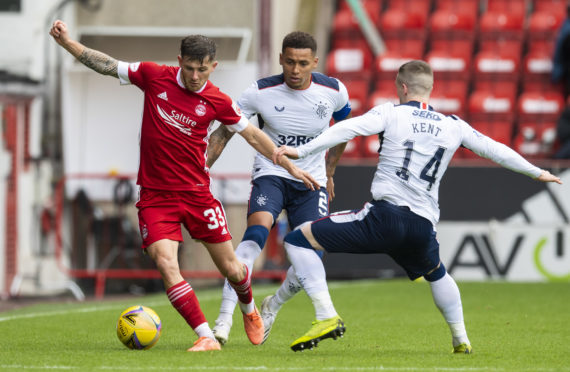Aberdeen boss Derek McInnes has refused to lay the blame for Rangers’ Pittodrie winner on centre-backs Scott McKenna and Ash Taylor.
Taylor appeared to get sucked towards the ball near halfway in the Gers’ Premiership season-opening 1-0 victory yesterday, allowing Ryan Kent to run clear with the ball and fire low past Joe Lewis.
After the behind-closed-doors encounter, however, boss McInnes – who claimed the Dons had grown into the game after Kent’s opener – said the goal was the result of lacklustre pressing from his forward players.
He said: “I am disappointed to lose the first game of the season.
“I thought we got better as the game went on as initially Rangers imposed themselves in possession.
“They are a possession-based team and their movement at the top end of the pitch can give you that overload.
“For their goal, people will look at my centre-backs there, but I don’t blame them at all.
“The press has got to come further up the pitch as when (full-back James) Tavernier gets the ball he must be shown down the line.
“We allowed that pass to come inside and as soon as that happens you can be susceptible and exposed.
“If we do our press right the centre-halves are expecting that ball to be played down the channel and we would have dealt with that goal.”
McInnes said he thought Aberdeen were “still in the game” until Andy Considine’s 86th–minute straight red card for a studs-up tackle on Scott Arfield.
His manager accepted it was a sending off offence, but also questioned whether red cards are more prevalent for tackles like Considine’s early in the campaign. McInnes added: “Whether that is a red card 10, 15 games into the season, who knows.”
